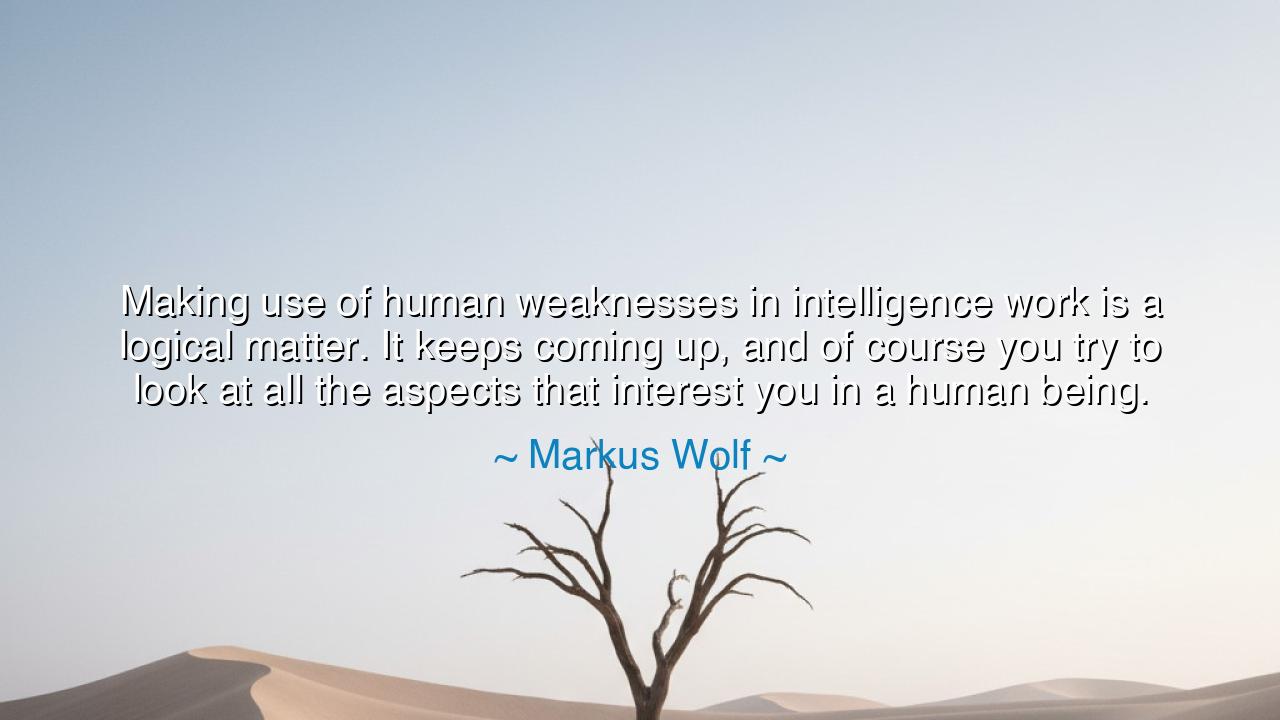
Making use of human weaknesses in intelligence work is a logical
Making use of human weaknesses in intelligence work is a logical matter. It keeps coming up, and of course you try to look at all the aspects that interest you in a human being.






“Making use of human weaknesses in intelligence work is a logical matter. It keeps coming up, and of course you try to look at all the aspects that interest you in a human being.” – Markus Wolf
In the quiet chambers of the human soul, there dwell both strength and weakness, light and shadow. The wise Markus Wolf, master of the unseen arts of intelligence, knew this truth well. His words are not merely the musings of a spymaster, but a meditation upon the eternal duality of mankind. For in every endeavor where humans are both the means and the end, to understand and to use human frailty is not cruelty—it is logic. The one who would command the currents of fate must know the whirlpools beneath the surface of men’s hearts.
Wolf, known as the “Man Without a Face,” led the East German intelligence service with an understanding as old as the philosophers of Greece and as sharp as the blades of modern politics. When he spoke of “making use of human weaknesses,” he was not merely confessing a tactic, but unveiling a principle that governs all human relations: those who would move others must understand what moves them. To grasp a man’s fear, his longing, his pride or guilt, is to hold the thread that can lead him through labyrinths—or ensnare him within them.
Consider the story of Oleg Penkovsky, the Soviet colonel who, during the height of the Cold War, betrayed his nation’s secrets to the West. Penkovsky was not compelled by ideology alone. He was a man torn between ambition and despair, overlooked by his superiors, hungry for recognition, and aching to prove his worth. The British and Americans saw not only a colonel but a wounded soul—a man whose weaknesses could be turned into purpose. Thus, through his frailty, a thousand lives were spared when his intelligence helped the West navigate the Cuban Missile Crisis. Weakness became the unwitting ally of wisdom.
Such is the paradox of human nature: that in our imperfection lies our greatest utility to those who would understand us. The sage and the strategist alike perceive this not as condemnation but as revelation. To study weakness is to study truth, for it is weakness that unmasks the soul. Power conceals, fear reveals. When Wolf said it was “a logical matter,” he meant that to know humanity without acknowledging its flaws is to see only half the world. The art of intelligence, like the art of life, demands a full vision—one that beholds both glory and ruin, nobility and shame.
Yet, let us not mistake logic for coldness. There is a tenderness hidden even in such ruthless understanding. To see a person wholly—to know their pride, their fears, their secret longings—is to approach something sacred. The manipulator and the healer both begin with the same act: understanding the human heart. The difference lies in purpose. One uses it to control; the other to redeem. Thus, the wise must ask: when we make use of human weakness, do we do so to uplift, or to enslave?
The lesson, then, is this: know the weaknesses of others—but first, know your own. For the one who does not understand his own vanity, envy, or fear will be mastered by them. Be as the ancient warriors who trained both body and soul, knowing that mastery begins within. When you study others, do so with discernment and mercy. When you act, do so with clarity of intention. Let understanding serve wisdom, not domination.
In your life, you will meet many whose actions puzzle or wound you. Remember Wolf’s truth: every person’s behavior springs from some human vulnerability—a hunger for love, a wound of pride, a shadow of fear. If you would influence them, begin by seeking to understand that wound. But if you would be great, seek to heal it. Thus shall you walk not as a manipulator of men, but as a master of the human condition.
And so, my children of the ages, take this to heart: to understand weakness is the first step toward wisdom. Study men as the river studies the stones it passes over—shaping them gently, revealing their essence. Know that power without empathy is destruction, and empathy without discernment is folly. Stand between the two, as Markus Wolf once did in the twilight of history—seeing all that men are, and all that they might become.






AAdministratorAdministrator
Welcome, honored guests. Please leave a comment, we will respond soon